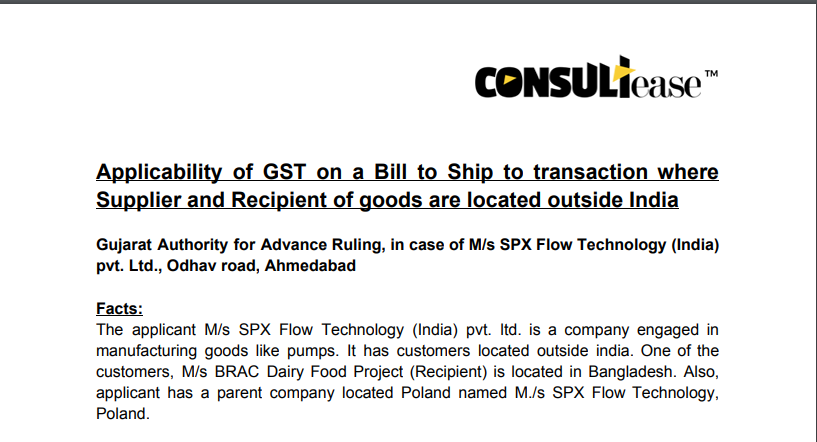Applicability of GST on a Bill to Ship to transaction where Supplier and Recipient of goods are located outside India.
Table of Contents
Applicability of GST on a Bill to Ship to transaction where Supplier and Recipient of goods are located outside India.
Gujarat Authority for Advance Ruling, in case of M/s SPX Flow Technology (India) Pvt. Ltd., Odhav Road, Ahmedabad
Facts:
The applicant M/s SPX Flow Technology (India) Pvt. Ltd. is a company engaged in manufacturing goods like pumps. It has customers located outside India. One of the customers, M/s BRAC Dairy Food Project (Recipient) is located in Bangladesh. Also, the applicant has a parent company located in Poland named M./s SPX Flow Technology, Poland.
The applicant received an order from a Customer in Bangladesh for the supply of spare parts of dairy machinery. After receiving the order, the applicant places such an order to M/s SPX Flow Technology, Poland (Supplier). But the goods are directly delivered from Poland to customers located in Bangladesh on a CIF basis without bringing them to India.
As for the payment, the supplier (Poland) issues a set of invoices to applicants in India, and at the same point of time, the applicant company raises a set of commercial invoices to M/s BRAC Dairy Food Project, Bangladesh, and payment are received through normal banking channels.
The ruling has been sought for the following two questions:
a) Determination of the liability to pay tax on any goods or services or both.
b) whether any particular thing done by the applicant with respect to any goods or services or both amounts to or results in a supply of goods or services or both, within the meaning of that term.
Summarized View:
There are two legs involved in the present case,
a) Whether raising purchase orders by applicants of India with the parent company of Poland amounts to the import of goods?
b) Whether payment received by the applicant in India from a customer in Bangladesh for the supply of goods directly from Poland to Bangladesh amounts to the export of goods?
Applicant’s Submission:
- The applicant has taken a view that placing an order with the parent company and making payment thereafter does not constitute the Import of goods into India. Reference has been given to the definition of Import of goods which states that goods must be brought into India from a place outside India.
“2(10) Import of goods” with its grammatical variations and cognate expressions, means bringing goods into India from a place outside India.”
In this case, goods are never brought into India and such goods do not cross the customs frontier of India instead directly exported from Poland to Bangladesh.
Reference has also been made to Customs Act where IGST is applicable on goods which are leviable to custom duty. Since the goods have never crossed custom frontiers, Custom duty shall not be applicable, hence no question of IGST. Also, as per Section 1 of CGST & IGST, the GST Acts are applicable to the whole of India, except Jammu & Kashmir and section 7 of CGST Act, is applicable on supplies made within the territory of India. In the present case, goods have been directly delivered to the recipient without entering the territory of India. Hence, IGST is not applicable.
“Section 3(7) of Customs, Tariff Act, as amended, Any article which is imported into India shall, in addition, be liable to integrated tax at such rate, not exceeding forty percent as is leviable under section 5 of the Integrated Goods and Services Tax Act, 2017 on a like article on its supply in India, on the value of the imported article as determined under sub-section (8).
2. The applicant also justified his view that raising an invoice to the recipient located in Bangladesh for goods delivered to him does not qualify as an export of goods.
Export of goods means where goods are taken out of India to a place outside India.
“Section 2(5): “Export of goods” would mean—‘With its grammatical variations and cognate expressions, means taking goods out of India to a place outside India”.
In order to qualify the definition of exports, goods must be taken out of India. In this case, when goods are not present in India, there is no question of taking goods out of India, therefore IGST cannot be levied. The present transaction can only be considered as an out and out transaction i.e beyond the territory of India.
3. Reference has been given to the definition of “recipient”
“(93) “recipient” of supply of goods or services or both, means—
(a) where a consideration is payable for the supply of goods or services or both, the person who is liable to pay that consideration;
(b) where no consideration is payable for the supply of goods, the person to whom the goods are delivered or made available, or to whom possession or use of the goods is given or made available; and
(c) where no consideration is payable for the supply of a service, the person to whom the service is rendered, and any reference to a person to whom a supply is made shall be construed as a reference to the recipient of the supply and shall include an agent acting as such on behalf of the recipient in relation to the goods or services or both supplied;”
As per the above definition, the recipient is the person who is liable to pay the consideration. In this case, M/s BRAC Dairy and Food Project, Bangladesh is liable for paying consideration.
Related Topic:
GST on import of services
The applicant also referred to the definition of “Supplier”
“(105) “supplier” in relation to any goods or services or both, shall mean the person supplying the said goods or services or both and shall include an agent acting as such on behalf of such supplier in relation to the goods or services or both supplied;”
Keeping in view the above definition, the supplier is the person who is physically supplying the goods and does not deem the other person who is raising the Invoice for goods.
4. Another important reference has been given to Entry No. 7 of Schedule III of CGST Act, 2017 which specifies that a transaction shall neither be treated as a supply of goods or services when the goods are supplied from one non-taxable territory to another non-taxable territory without goods being entered into India.
So, the case fits into a schedule III transaction and shall not qualify as a supply of goods.
5. So the pray before the advance ruling authority is that:
(i) The present transaction may be declared as a transaction falling within Sr.No.7 of Schedule 3 of the CGST Act, 2017 and hence not taxable;
(ii) It may be held and declared that the present transaction is not liable to GST/IGST in as much as the entire transaction is beyond the territory of India and accordingly beyond the scope and coverage of the CGST and the IGST Act, 2017;
(iii) It may be held and declared that Out and Out transactions, where goods move from one foreign country to the other, are not chargeable to IGST.
(iv) Any other further order and relief as may be deemed fit in facts and circumstances of this case may also be granted.
AAR Order:
6. Regarding the first leg of Import of goods, reference has been made to Circular no. 3/2017 Customs dt 01.08.2017 issued for “High Seas Sale”, wherein it is clarified that all duties and taxes shall be collected at the time of importation before customs authorities. The circular shall be applicable in the present case. Since the goods have never entered the custom frontier, no bill of entry is filed and thus there is no question of GST.
7. As far as leviability of GST is concerned on the outward supply of goods from vendor to customer. One has to check whether the transaction constitutes “supply”.
Section 7 of CGST Act,
“(1) For the purposes of this Act, the expression “supply” includes —
(a) all forms of supply of goods or services or both such as sale, transfer, barter, exchange, license, rental, lease or disposal made or agreed to be made for a consideration by a person in the course or furtherance of business;
(b) import of services for a consideration whether or not in the course or furtherance of business; [and]
(c) the activities specified in Schedule I, made or agreed to be made without a consideration;”
Also as per the definition of supplier:
“(105) “supplier” in relation to any goods or services or both, shall mean the person supplying the said goods or services or both and shall include an agent acting as such on behalf of such supplier in relation to the goods or services or both supplied;”
AAR finds that the applicant is playing the role of a THIRD PARTY on whose direction goods are being supplied by the supplier (SPX Flow Technology) of Poland to the customer in Bangladesh. THUS, THE APPLICANT IS ACTING AS AN AGENT on behalf of the supplier, qualifying as a supplier and also fulfills the condition of ‘supply’
8. Since the transaction qualifies as Supply, now it is to be checked whether it is Interstate or Intra State supply. Section 7 of the IGST Act, states that where the location of supplier is in the taxable territory and the place of supply is outside the taxable territory. The supply shall be an Interstate supply.
In order to ascertain POS, section 10 (1)(a) of IGST is applicable which states that POS shall be the place where the movement of goods terminated for delivery to the recipient. In this case, goods have been delivered outside India i.e Bangladesh. Hence, it is an Interstate supply.
Since it qualifies as an Inter-State supply, IGST shall be applicable. The possible scenarios for non-leviability of IGST are that either it is an exempt supply or a Zero rate supply. Considering this, the applicant has nowhere mentioned that the goods involved are exempted. The last possibility is to determine whether the supply constitutes Zero-rated supply or not?
Referring to the definition of export we find that goods have never entered into India thus, there is no question of taking goods out of India. So transaction does not qualify as export of goods, failing to constitute a zero-rated supply. So, it is evident to say that the transaction qualifies as an inter supply and liable to IGST.
9. Lastly, reference has been given to Entry No.7 of schedule III of CGST Act which deals with No supply transactions. It is pertinent to note that such an amendment was inserted through Central Goods and Services Tax (Amendment) Act, 2018 dt. 01.02.2019. Thus, for transactions up to 31.01.2019 IGST shall be leviable and after 01.02.2019, No IGST shall be applicable.
Conclusion
Question-1: Whether the activity undertaken by the applicant is covered by Entry No.7 in Schedule 3 of the CGST Act, 2017?
The activity is undertaken by the applicant M/s. SPX Flow Technology (India) Pvt.Ltd., Ahmedabad is covered under Entry No.7 in Schedule 3 of the CGST Act, 2017 in respect of the transactions undertaken for the period from 01.02.2019 onwards for the reasons discussed hereinabove.
Question-2: Whether the applicant is liable to pay IGST on out and out transactions taking place beyond the Customs frontiers of India?
Applicable IGST is payable on goods sold to customers located outside India, where goods are shipped directly from the vendor’s premises (located outside India) to the customer’s premises (located outside India) for such transactions effected up to 31.01.2019. However, no IGST is payable on such transactions effected from 01.02.2019 onwards, for the reasons discussed hereinabove.













